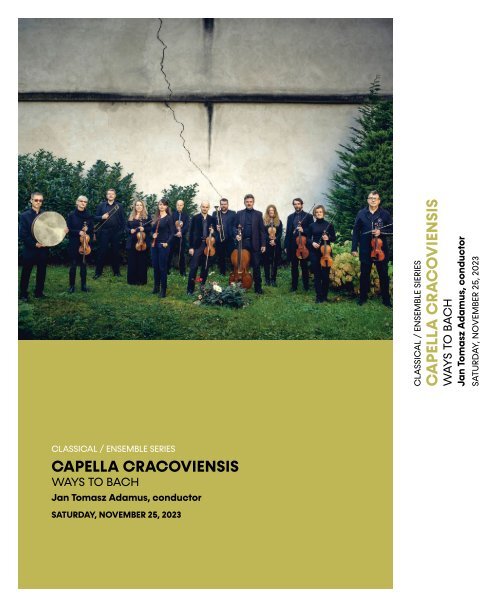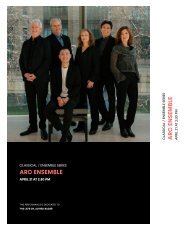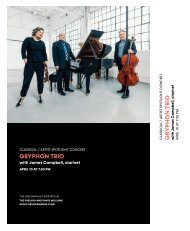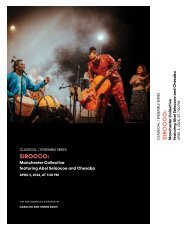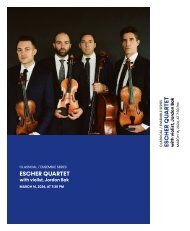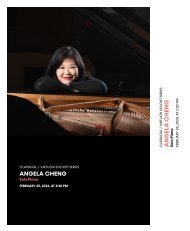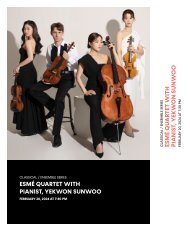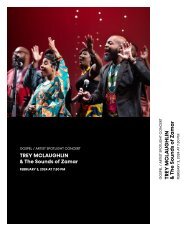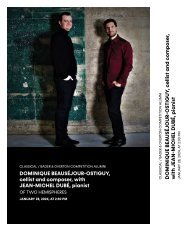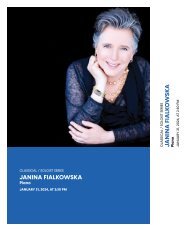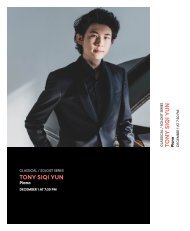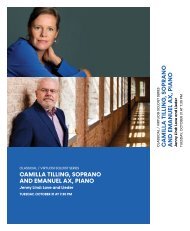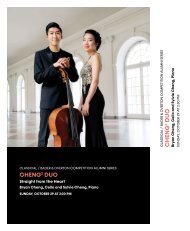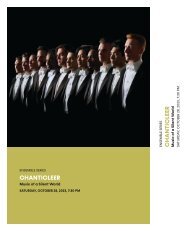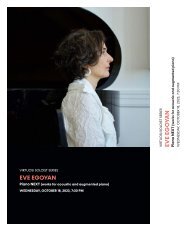Capella Cracoviensis | November 25, 2023 | House Program
Create successful ePaper yourself
Turn your PDF publications into a flip-book with our unique Google optimized e-Paper software.
CLASSICAL / ENSEMBLE SIERIES<br />
CAPELLA CRACOVIENSIS<br />
WAYS TO BACH<br />
Jan Tomasz Adamus, conductor<br />
SATURDAY, NOVEMBER <strong>25</strong>, <strong>2023</strong><br />
CLASSICAL / ENSEMBLE SERIES<br />
CAPELLA CRACOVIENSIS<br />
WAYS TO BACH<br />
Jan Tomasz Adamus, conductor<br />
SATURDAY, NOVEMBER <strong>25</strong>, <strong>2023</strong>
CLASSICAL / ENSEMBLE SERIES<br />
CAPELLA CRACOVIENSIS<br />
WAYS TO BACH<br />
Jan Tomasz Adamus, conductor<br />
PROGRAM<br />
Mikołaj Zieleński (1550-1615) In monte Oliveti à 5<br />
Giovanni Gabrieli (ca.1554-1612) Magnificat à 12<br />
Mikołaj Zieleński Adoramus te Christe à 4<br />
Claudio Monteverdi (1567-1643) Adoramus te Christe à 6<br />
Mikołaj Zieleński Terra tremuit et quievit à 8<br />
Per signum Crucis à 4<br />
Vox in Rama à 4<br />
Magnificat à 12<br />
Heinrich Schütz (1585-1672) Syncharma Musicum: En novus Elysiis, SWV 49<br />
Johann Hermann Schein (1586-1630) Beati omnes à 8<br />
Bartłomiej Pękiel (1601-1670) Dulcis amor Jesu à 5<br />
Johann Michael Bach (1648-1694) Herr, wenn ich nur dich habe à 5<br />
Andrea Gabrieli (1532/33-1585) O sacrum convivium à 5<br />
Johann Sebastian Bach (1685-1750) O Jesu Christ mein’s Lebens Licht, BWV 118<br />
PROGRAM NOTES<br />
In this marvellously curated program of Baroque<br />
choral music composed during the century<br />
before Johann Sebastian Bach’s career, we<br />
have a chance to experience the classical vocal<br />
polyphony that composers were creating<br />
in Europe and, in some instances, may have<br />
provided inspiration and models for Bach himself.<br />
Little is known about Mikołaj Zieleński, except<br />
that he was a Polish composer, organist and choir<br />
director in the early 1600’s. While details of his life<br />
may be missing, his music was so admired, that<br />
he was the only Polish composer of this period<br />
to see his music published in Venice during his<br />
lifetime. His music at times exemplifies a superb<br />
control of chromatic dissonance for expressive<br />
purposes as can be heard in the opening motet,<br />
In monte Oliveti (On the Mount of Olives), and<br />
Vox in Rama (The Voice of Rama). Later, another<br />
early Baroque Polish composer, Bartłomiej Pękiel,<br />
is represented by a five-part motet with continuo,<br />
Dulcis amor Jesu (Jesus, My Sweet Love), that not
only uses chromatic dissonance to equally inspire<br />
expressiveness, but also displays a high-level of<br />
imitative counterpoint where the same melodic<br />
idea moves through all five parts.<br />
Giovanni Gabrieli, the principal organist and<br />
composer of Venice’s St. Mark’s Basilica from<br />
1585 until his death in 1612, benefited from<br />
the mentorship of his uncle, Andrea Gabrieli,<br />
and similarly returned the favour to the many<br />
composers who visited Venice from across<br />
Europe, including Heinrich Schütz. The three,<br />
4-part choirs that Giovanni Gabrieli used in<br />
dialogue in the Magnificat setting is an excellent<br />
example of resonantly glorious choral writing and<br />
Zieleński’s 12-part version is similarly impressive.<br />
Another Venetian composer, Claudio Monteverdi<br />
(1567-1643), was equally adept at writing<br />
beautiful choral music that combines chordal<br />
writing with florid counterpoint as can be heard<br />
in this six-part setting of the Good Friday text,<br />
Adoramus te, Christe (We Adore Thee, O Christ).<br />
J.S. Bach knew and studied the music of Heinrich<br />
Schütz and Johann Schein, with Schein also<br />
having served as the Cantor of the St. Thomas<br />
Church in Leipzig from 1615-1630, a post Bach<br />
held from 1723-1750. Schütz’s Syncharma<br />
Musicum: En novus Elysiis, is the only secular<br />
work on this program and is a very triumphant<br />
ceremonial motet written for the 1621 swearing<br />
of allegiance of the Silesian nobility to Johann<br />
Georg of Saxony as the representative of<br />
Emperor Ferdinand.<br />
A distant relative of J. S. Bach, the older church<br />
organist and composer, Johann Michael Bach,<br />
later became more closely connected through<br />
marriage when his youngest daughter, Maria<br />
Barbara, married Johann Sebastian in 1707. In<br />
J.M. Bach’s funeral motet, Herr, wenn ich nur<br />
dich haben (Lord, if I have you alone), it is worth<br />
listening closely to the soprano’s ornamented<br />
chorale because it is the same melody used in<br />
the J. S. Bach motet that ends today’s concert.<br />
As with J. M. Bach’s treatment, J.S. Bach places<br />
the chorale melody in the sopranos, but with<br />
contrapuntal ingenuity, treats each phrase of<br />
the melody in imitation in the lower parts<br />
reaching a density of seven separate voices.<br />
©<strong>2023</strong> by John Burge for the Isabel<br />
ABOUT CAPELLA CRACOVIENSIS<br />
<strong>Capella</strong> <strong>Cracoviensis</strong> (CC) chamber choir and<br />
orchestra is one of the most interesting ensembles<br />
on the contemporary scene of period music.<br />
Its repertoire ranges from Renaissance polyphony<br />
to early Romantic operas performed on period<br />
instruments using historical performance<br />
techniques. CC has been hosted at many<br />
important festivals and concerts halls, including<br />
Concertgebouw Amsterdam, Bachfest Leipzig,<br />
SWR Festspiele Schwetzingen, Händel Festspiele<br />
Halle, Haydn Festspiele Brühl, Opéra Royal<br />
Versailles, Theater an der Wien, the Polish<br />
National Radio Symphony Orchestra in Katowice,<br />
Szczecin Philharmonic and the Misteria Paschalia<br />
Festival in Krakow. The ensemble has already<br />
performed with such eminent guests as Evelino<br />
Pidó, Christophe Rousset, Alessandro Moccia,<br />
Giuliano Carmignola, Paul Goodwin, Andrew<br />
Parrott and Paul McCreesh.<br />
One of CC’s greatest successes was the<br />
performance of all Beethoven’s symphonies<br />
on historical instruments within one day, on 27<br />
August 2016 in Krakow, with live transmission<br />
on the radio. The total of 2300 audience<br />
members could appreciate the mastery of 90<br />
instrumentalists, 44 singers and 5 conductors.<br />
The latest achievements of CC include the first<br />
performance of Wagner’s works on historical<br />
instruments with the participation of Waltraud<br />
Meier (Wesendonck-Lieder) and the recording of<br />
the following operas by Pergolesi and Porpora for<br />
Decca Records: Pergolesi: Adriano in Siria (Fagioli<br />
Basso Sancho Adamus) and Porpora: Germanico<br />
in Germania (Cencic Leznieva Adamus) which<br />
was awarded with Diapason d’Or.<br />
CC’s other albums include Te Deum / Lully<br />
& Charpentier with Le Poème Harmonique<br />
(conducted by Vincent Dumestre) and the<br />
recordings of Bach’s motets (conducted by<br />
Fabio Bonizzoni) for Alpha records as well as<br />
the piano concerto in F minor and the unfinished<br />
symphony by Schubert (Klimsiak / Adamus)<br />
for AviMusic.<br />
In May 2018 CC began the six-year project Haydn:<br />
complete symphonies 2018-<strong>2023</strong> including<br />
concerts and live recordings.
CC has staged the following operas: Amadigi di<br />
Gaula by Handel, The Marriage of Figaro by Mozart<br />
and Orfeo ed Euridice by Gluck, and prepared<br />
such special projects as Monteverdi’s madrigals<br />
performed in a milk bar, Mendelssohn’s songs for<br />
choir staged in the woods and A Midsummer Night’s<br />
Dream with the participation of children with visual<br />
impairments as actors or Mozart’s Requiem as<br />
karaoke directed by Cezary Tomaszewski.<br />
CC was established in 1970 on the initiative of<br />
Jerzy Katlewicz, Director of Krakow Philharmonic<br />
at that time, who appointed Stanisław Gałoński to<br />
create an ensemble specialising in period music<br />
performance. Over the years, <strong>Capella</strong> <strong>Cracoviensis</strong><br />
became an independent entity performing various<br />
repertoire ranging from Medieval music to world<br />
premieres of contemporary pieces. Since <strong>November</strong><br />
2008, Jan Tomasz Adamus has been CC’s General<br />
and Artistic Director.<br />
<strong>Capella</strong> <strong>Cracoviensis</strong> owes special<br />
thanks to the Embassy of the<br />
Republic of Poland in Ottawa for<br />
its support of the concert tour in<br />
Canada in <strong>November</strong> <strong>2023</strong>.<br />
ABOUT JAN TOMASZ ADAMUS,<br />
CONDUCTOR<br />
Jan Tomasz Adamus – a conductor, organist,<br />
harpsichordist and culture creator; he studied in<br />
Krakow and Amsterdam and taught at the Academy<br />
of Music in Wrocław for a number of years.<br />
In 2008 he was appointed General and Artistic<br />
Manager of <strong>Capella</strong> <strong>Cracoviensis</strong>, an institution<br />
of culture which is a chamber choir and period<br />
instrument orchestra based in Krakow with which he<br />
performed at many major festivals and in renowned<br />
concert halls: Concertgebouw Amsterdam, Theater<br />
an der Wien, Haydn Festspiele Brühl, Festiwal<br />
Muzyki Polskiej, NOSPR Katowice, SWR Festspiele<br />
Schwetzingen, Bachfest Leipzig, Händel Festspiele<br />
Halle. His numerous recordings include solo organ<br />
repertoire, Polish old music, baroque operas and<br />
Romanticism on period instruments (Chopin,<br />
Schubert, Moniuszko).<br />
Give the gift of music this holiday<br />
season with an Isabel Gift Certificate<br />
in the amount of your choice.<br />
MANCHESTER COLLECTIVE<br />
WITH ABEL SELAOCOE<br />
TREY MCLAUGHLIN<br />
& THE SOUNDS OF<br />
ZAMAR GOSPEL CHOIR<br />
SING AND SWING—<br />
A JAZZ AT LINCOLN CENTER<br />
PRESENTS PRODUCTION<br />
GRYPHON TRIO<br />
GIFT CERTIFICATES AVAILABLE AT: queensu.ca/theisabel · 613-533-2424


